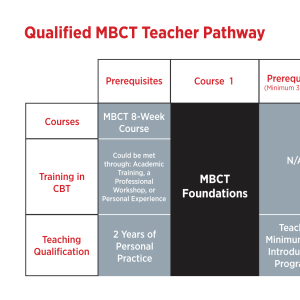Curriculum
The MBCT teacher training pathway involves coursework along with personal practice and progressively more advanced teaching practice.
Sub Navigation
MBCT Teacher Certification Pathway
The Certificate in Teaching Mindfulness-Based Cognitive Therapy is a sequential training pathway enabling you to become a Mindfulness Facilitator, Qualified MBCT teacher and then advance to a Certified MBCT teacher. This journey consists of prerequisites, four courses, individual mentoring and one final review. The pathway also requires three silent retreats and progressively more advanced teaching requirements that are necessary to complete the training.
Training Pathway at a Glance
View the infographics to understand your training options, from Mindfulness Facilitator to Certified MBCT Teacher.
The prerequisites to begin MBCT teacher training involve both formal learning and personal practice experiences:
Prerequisites:
- Maintaining a personal meditation practice of at least two years (less experience may be considered)
- A graduate degree (healthcare and counseling preferred—others considered). Equivalency in experience is considered and must be demonstrated (additional written document required within application).
- Training in cognitive behavioral therapy
- Attendance at an 8-week MBCT program*
- It is important to take this MBCT program before deciding to be an MBCT teacher and before beginning the training so that you make a more informed decision that requires a major commitment and can experience the program fully as a participant. You will then take a second 8-week MBCT program as part of MBCT Foundations amf Facilitator Training. The second time around, you will be invited to participate fully in the classes, and you will also be invited to observe what is happening in the classes. The weekly MBCT class becomes a key part of each Foundations seminar as you have an opportunity to unpack the program with your classmates and the instructor.
*Brown University offers the 8-week MBCT prerequisite.
The first step in the certificate explores the very personal nature of mindfulness practice and students begin to cultivate skills for the classroom and private practice.
Upon successful completion of this course, participants earn the Mindfulness Facilitator credential, qualifying them to teach introductory mindfulness sessions and workshops in a variety of settings, including clinical, healthcare, social work and related community settings.
In the next step of the certificate program, students strengthen their teaching skills and deepen their personal practice.
Qualified Teacher Requirements:
- Attending your first qualifying retreat is encouraged. You may complete either one 5-7 day retreat or two 3-day retreats.*
- Teach a minimum of three introductory sessions
- MBCT Teacher Advancement Intensive (TAI)
*Retreats are not included in the MBCT Certificate fee, and may incur an additional cost.
As the culmination of the certificate program, students will complete two elective courses, satisfy all teaching requirements, engage in required silent retreats and finalize their preparations for the Teacher Certification Review.
Certification Requirements:
Ethos of Mindfulness-Based Programs (MBPs)* – offered as two six-week hybrid courses:
- Dialogue and Inquiry for Mindfulness-Based Programs*
- Individual Mentoring
- Must have attended three qualifying silent retreats. You may complete either one 5-7 day retreat or two 3-day retreats. One retreat must be Insight Inside Us.**
- Successfully teach a cumulative total of six 8-week MBCT programs
- MBCT Teacher Certification Review
*May be taken at any time after completing MBCT Foundations and Facilitator Training.
**Retreats are not included in the MBCT Certificate fee, and may incur an additional cost.
What You Will Learn
As a global leader in mindfulness-based teacher training, the Mindfulness Center at Brown through the School of Professional Studies offers an experiential and didactic education. In the certificate program as an MBCT teacher-trainee, you can:
- Teach MBCT in a manner that reflects a nuanced comprehension of MBCT’s confluence of eastern contemplative methodologies and western science to skillfully meet individuals living with recurrent depression and negative affective states in the classroom
- Teach MBCT with a sense of balanced confidence, skill and authenticity
- Recognize and analyze MBI:TAC domains and how they are expressed in the MBCT classroom
- Independently teach MBCT at the “Competent” level, as assessed by the MBI-TAC
Course Descriptions
Optional/Supplemental Offering
Continuing Education Courses
There are also professional continuing education programs for MBCT & MBSR teachers and teachers-in-training that are not required for certification to teach and are offered to enhance the teacher’s knowledge and competencies.
